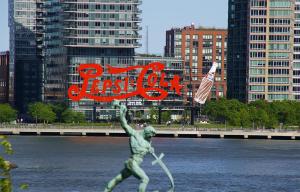nsnbc : Russia’s State agricultural watchdog Rosselkhoznadzor has accused PepsiCo this week of stealing its internal documents and engaging in alleged commercial espionage.
The scandal broke on Monday when State watchdog Rosselkhoznadzor published a report on its website claiming that the American multinational PepsiCo illegally obtained access to its internal service documents.
Rosselkhoznadzor states that it learned of the crime when a PepsiCo executive showed a copy of a document marked for “internal use” at a meeting with the agency. “The document was not sent to PepsiCo,” Rosselkhoznadzor’s report read. “This fact indicates that the American company uses illegal methods of obtaining information from government agencies.”
Rosselkhoznadzor representative Yulia Melano told the RBC business portal on Tuesday that the document gave PepsiCo a competitive advantage over other companies in Russia.
PepsiCo rejects the accusations. On Tuesday, Pepsi’s Vice President Sergei Glushkov, the executive cited in the report, answered the allegations saying that PepsiCo “categorically rejects the absurd assumptions of Rosselkhoznadzor,” Glushkov was cited as saying by RBC. “They do not have any grounds for the claim,” he added.
However, the scandal broke actually late last month already, when the state agency said it found antibiotics in the cheese of one of PepsiCo’s subsidiaries and prohibited it from being sold. PepsiCo denied the claims and said it was considering legal action. “We are considering turning to law enforcement agencies and the court to protect our legal interests,” Glushkov was cited as saying by the Interfax news agency at the time. Russia’s Minister of Agriculture Alexander Tkachev told journalists on Wednesday that the conflict would be resolved soon, RBC reported. “[The conflict] will be exhausted in the coming days, and maybe even hours,” he said.
However, the scandal broke – arguably – already last month when a Russian lawmaker insisted that the “foreign agent” media scandal should be turned into a food fight – seriously.
No more than 72 hours had passed in late November 2017, since Russian legislators pushed through legislation that could see international media outlets be designated as foreign agents, when a Russian lawmaker suggested that Russia also should set its sights on American fast food chains, thus turning the row over State and corporate, state-influenced propaganda into a food fight.
Russian lawmakers responded to the United States designating State broadcaster Russia Today as a foreign agent. Legislators in Moscow retaliated by adopting legislation that could see major foreign broadcasters such as CNN, Voice of America, and many others designated as foreign agents.
Russia’s parliament overwhelmingly passed amendments last month that allow the government to label news outlets funded from abroad “foreign agents.” The bill, which President Vladimir Putin is expected to sign into law, was adopted by an overwhelming majority.
However, State Duma (lower house of parliament) Deputy Boris Chernyshov, a member of the Liberal Democratic Party (LDPR) apparently wants to spice the propaganda war by adding a food fight.
Chernyshov suggested that food chains like McDonalds, KFC, and other American fast food restaurant chains operating in Russia should also be designated as foreign agents. Cheryshov didn’t specify whether the receipts and food wrappers should have printed a “served to you by a foreign agent” label.
However, Chernyshov told the RBC business portal that he had sent a letter to Russia’s food and media watchdog proposing that ads for the fast food chains be marked as belonging to a foreign agent.
The next step, he suggested, would be to include fast food chains in the foreign agent registry. “Research has shown that food sold by American fast-food restaurants is damaging to people’s health,” Chernyshov said. “But ads show only the positive side of consuming these products.” Chernyshov was cited by Russian media on Friday criticizing the chains for contributing to the decline of Russian cuisine.
Some critics of Chernyshov’s proposal say McDonalds food is so crappy that they probably would see a foreign agent label imposed on them as free – James Bond-style advertising. Russian authorities have apparently achieved that PepsiCo now can brand itself as “Spy in Russia”, something that almost sounds as sexy in an ad as “This bottle contains a foreign agent” one that’s “alien” to the body.
CH/L – nsnbc 06.12.2017
Source Article from https://nsnbc.me/2017/12/06/russian-watchdog-accuses-pepsico-of-commercial-espionage/
 RSS Feed
RSS Feed















 December 7th, 2017
December 7th, 2017  Awake Goy
Awake Goy 












 Posted in
Posted in  Tags:
Tags: 













